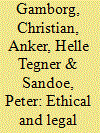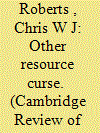| Srl | Item |
| 1 |
ID:
132667


|
|
|
|
|
| Publication |
2014.
|
| Summary/Abstract |
The article focuses on the interplay between two factors giving rise to friction in bioenergy governance: profound value disagreements (e.g. the prioritizing of carbon concerns like worries over GHG emissions savings over non-carbon related concerns) and regulatory complexity (in terms of regulatory measures and options). We present ethical and legal analyses of the current stalemate on bioenergy governance in the EU using two illustrative cases: liquid biofuels for transport and solid biomass-based bioenergy. The two cases disclose some similarities between these two factors, but the remaining differences may partly explain, or justify, contrasting forms of governance. While there seems to be no easy way in which the EU and national governments can deal with the multiple sustainability issues raised by bioenergy, it is argued that failure to deal explicitly with the underlying value disagreements, or to make apparent the regulatory complexity, clouds the issue of how to move forward with governance of bioenergy. We suggest that governance should be shaped with greater focus on the role of value disagreements and regulatory complexity. There is a need for more openness and transparency about such factors, and about the inherent trade-offs in bioenergy governance.
|
|
|
|
|
|
|
|
|
|
|
|
|
|
|
|
| 2 |
ID:
139008


|
|
|
|
|
| Summary/Abstract |
Since 2010, many African governments have challenged twenty years of extractive sector liberalization that has played a key role in unlocking mineral riches and attracting foreign direct investment. The potential for extractives to drive economic structural transformation is intuitively attractive, the Africa Mining Vision (2009) document providing a primary template. Geological inheritance alone, however, is not a panacea for economic development, industrialization or poverty alleviation. While much attention to the ‘resource curse’ has identified the problem of excessive rent-seeking and the consequent impact on elite consolidation, democracy, governance and macroeconomic distortions, a more fundamental problem, the ‘other resource curse’, may be an overlooked driver: a lingering assumption that mineral resources should straightforwardly provide significant revenue streams for public goods, inputs for industrial transformation, and extensive employment. Geology alone is neither conducive nor antithetical to economic development. Stakeholders require a more comprehensive understanding of the possibilities and limits of extractives in contemporary Africa.
|
|
|
|
|
|
|
|
|
|
|
|
|
|
|
|